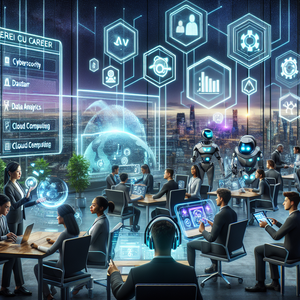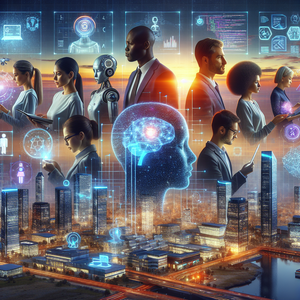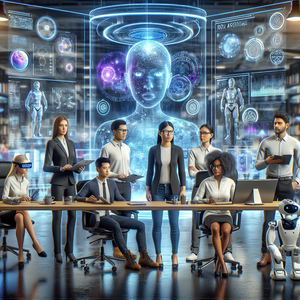
Tech Careers in 2025: Emerging Trends, High-Demand Roles, and How to Prepare
The tech industry is poised for a major comeback in 2025. After weathering a turbulent period marked by layoffs, hiring slowdowns, and widespread restructuring, the sector is gaining momentum as businesses adapt to an increasingly digital world. Reports like the *Indeed 2025 Hiring Trends Report* and insights from industry leaders such as *Forbes* and *TechTarget* point to a surge in demand for roles tied to game-changing technologies like artificial intelligence (AI), cloud computing, and advanced cybersecurity.
Job Summaries:
Software Developer:
- Software developers are responsible for designing, building, and maintaining software for businesses and consumer platforms.
- Demand for general software development roles cooled in 2024 but is recovering due to investments in mobile apps, cloud-native solutions, and low-code platforms.
- Developers with expertise in Python, Java, or C++ and familiarity with agile methodologies are highly sought after.
- Key trends include mobile-first experiences and the rise of low-code tools.
- Certifications in frameworks like React or Angular can help developers stand out.
Data Scientist:
- Data scientists turn raw data into actionable insights using tools like Python, R, and SQL.
- In 2025, they will be indispensable in industries like healthcare, retail, and logistics, focusing on real-time analytics and machine learning.
- Automated tools for data visualization are streamlining decision-making processes.
- Companies like Amazon and Netflix heavily invest in data science for personalized user experiences and trend forecasting.
Cybersecurity Analyst:
- Cybersecurity analysts are essential for protecting businesses against increasingly sophisticated cyberattacks.
- They identify vulnerabilities, implement protective measures, and ensure system safety.
- Certifications like CISSP and CEH are often required.
- Key trends for 2025 include the rise of zero-trust security models and the growing importance of IoT security.
- Salaries range from $100,000 to $140,000 annually.
Cloud Architect:
- Cloud architects design scalable, secure, and cost-effective cloud infrastructures.
- Expertise in platforms like AWS, Azure, and Google Cloud is essential.
- Hybrid cloud models and green cloud technologies are expected to dominate in 2025.
- Key trends include the popularity of hybrid solutions and the focus on sustainability in cloud computing.
- AWS Certified Solutions Architect certification is a recommended starting point.
AI Engineer:
- AI engineers develop intelligent systems for applications like predictive analytics and natural language processing.
- Proficiency in frameworks like TensorFlow or PyTorch and strong programming skills in Python are prerequisites.
- By 2025, they will focus on ethical AI systems prioritizing transparency and fairness.
- Generative AI tools and ethical AI are key trends.
- Salaries range from $150,000 to $180,000 annually.
DevOps Engineer:
- DevOps engineers streamline collaboration between development and IT operations teams, focusing on faster and more reliable software delivery.
- Expertise in tools like Docker, Kubernetes, and Jenkins is essential.
- In 2025, automation and scalability through advanced DevOps pipelines will be emphasized.
- Key trends include the adoption of CI/CD pipelines and Infrastructure as Code (IaC).
- Familiarity with Terraform and Ansible is recommended.
Blockchain Developer:
- Blockchain developers create decentralized applications (dApps) and smart contracts using platforms like Ethereum and programming languages like Solidity.
- In 2025, they will drive innovation in secure, transparent systems for finance, healthcare, and supply chain management.
- Key trends include the rise of decentralized finance (DeFi) and the use of blockchain for digital identity verification.
- Companies like IBM and Accenture are heavily investing in blockchain solutions.
UX/UI Designer:
- UX/UI designers create functional and enjoyable user experiences using tools like Figma, Sketch, and Adobe XD.
- By 2025, the focus will be on accessible, inclusive designs catering to diverse user groups.
- Key trends include the integration of AI tools for faster prototyping and heightened attention to accessibility standards.
- A certification in accessibility design can broaden career opportunities.
IT Project Manager:
- IT project managers oversee technology initiatives, ensuring timely delivery and alignment with business objectives.
- Strong leadership skills, expertise in tools like Jira, and certifications such as PMP are often required.
- Hybrid project management methodologies combining agile and traditional approaches are gaining popularity.
- Project managers will play a critical role in navigating complex, multi-disciplinary projects in 2025.
Machine Learning Engineer:
- Machine learning engineers design algorithms that enable machines to learn and improve from data.
- By 2025, their expertise will be pivotal in creating AI-driven solutions across industries like retail, healthcare, and transportation.
- Skills in frameworks like Scikit-Learn and TensorFlow, combined with a strong mathematical foundation, are essential.
- Edge AI and decentralized computing are key trends.
- Salaries range from $120,000 to $160,000 annually.
The tech landscape in 2025 is teeming with opportunities for those who are proactive and adaptable. By aligning your skills with emerging trends and pursuing relevant certifications, you can position yourself for success in this rapidly evolving industry. Whether you’re drawn to AI, cybersecurity, or cloud computing, the future of tech is bright—and you have the chance to be part of it.
Explore More Jobs

